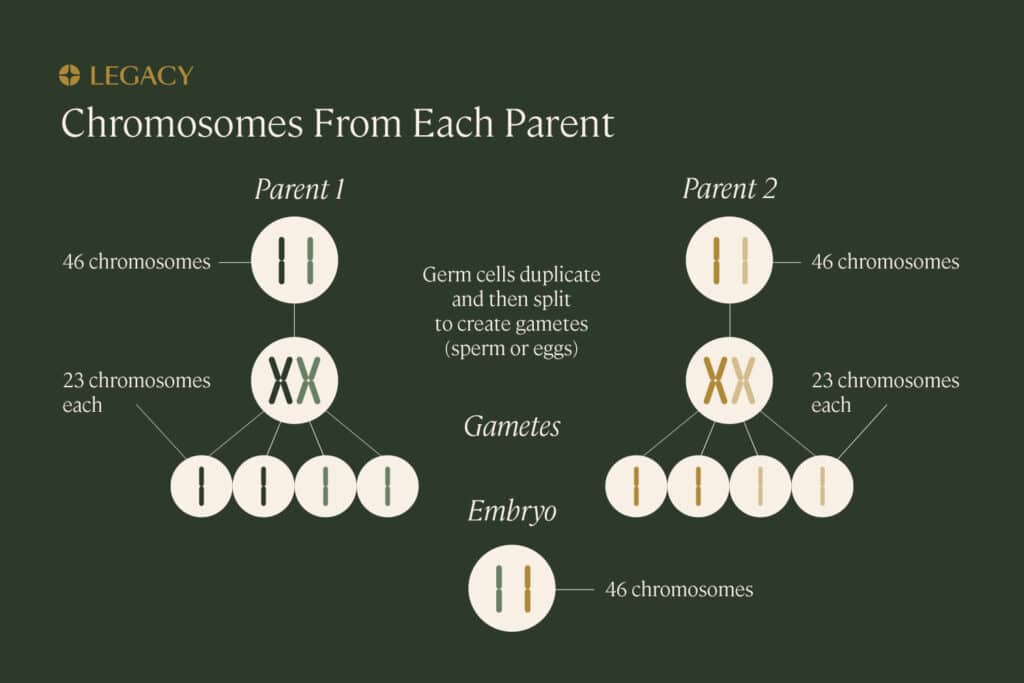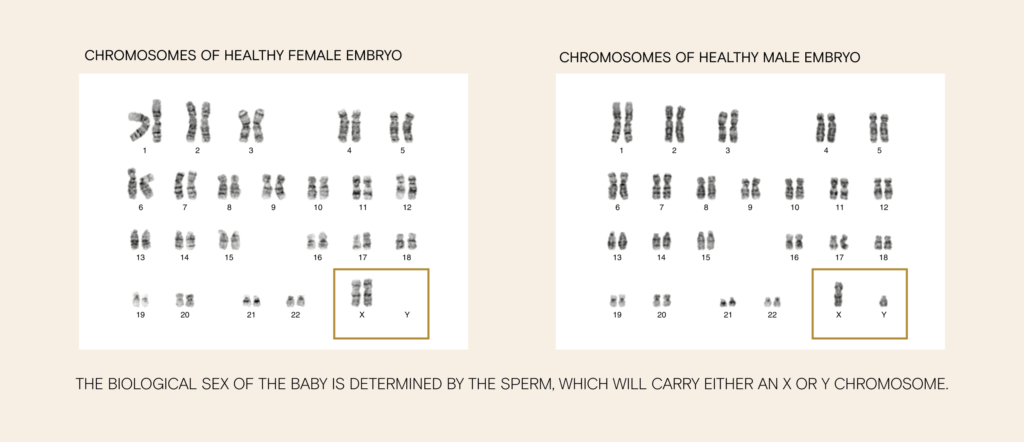Have you ever wondered why you have certain physical features, or maybe you look more like one of your parents than the other? These features are determined way before your birth — they’re actually controlled by your genes (DNA). Inside your cells are chromosomes, structures containing hundreds of genes that influence traits like eye and hair color, blood type, and even your chance of disease. Read on to learn more about chromosomes, how you can test for chromosomal abnormalities (karyotype testing), and how your genetics may affect your fertility.
Key takeaways
- People inherit chromosomes from both sets of parents that influence traits like eye and hair color, blood type, and chances of disease.
- Chromosomal abnormalities can lead to certain conditions like Klinefelter syndrome that can cause male-factor infertility.
- Genetic testing, including karyotype testing, can illuminate the causes behind male-factor infertility and other diseases and disorders.
What are chromosomes?
In the early 1900s, scientists building on the work of biologist Charles Darwin began to unravel the mystery of heredity. “Genes became the blessing and the curse our ancestors bestowed upon us,” wrote Carl Zimmer in She Has Her Mothers Laugh: The Powers, Perversions, and Potential of Heredity.
Genes are housed inside chromosomes. Chromosomes are threadlike structures made of DNA that carry the genomic information from cell to cell. All people have 22 pairs of numbered chromosomes and one pair of sex chromosomes (usually XX for females or XY for males), which adds up to 46 total. Children inherit half of their chromosomes from each parent.

What do chromosomes do?
Within your 46 chromosomes are all of the DNA “instructions” for your body. In addition to determining many of your physical characteristics, these genes contain a lot of information that helps cells grow and reproduce. They can influence childhood development, and the changes during puberty that lead to sexual maturity. Chromosomal genetic testing can be an important step to learn more about your fertility.
What is genetic karyotyping (chromosome analysis)?
A karyotype is a person’s complete set of chromosomes. Karyotype testing allows researchers to look at the size and shape of chromosomes, and detect chromosomal abnormalities in both number or structure. Karyotype testing can also detect if there are missing chromosomes or extra copies of certain chromosomes.
Potential chromosomal abnormalities detected in karyotype testing
A chromosome analysis or karyotype test can detect the following abnormalities, among others:
- Down syndrome (trisomy 21), in which there’s an extra (third) copy of chromosome 21
- Edwards syndrome (trisomy 18), in which there’s an extra copy of chromosome 18
- Patau syndrome (trisomy 13), in which there’s an extra copy of chromosome 13
- Klinefelter syndrome (47,XXY), in which a biological male has an extra X sex chromosome
- Turner syndrome, in which a biological female has a missing or damaged X chromosome (only one intact X chromosome)
These chromosomal abnormalities have varying levels of severity and impact on a person’s quality of life. Edwards and Patau syndromes, for example, are usually fatal due to abnormal development of important organ systems. Down syndrome causes intellectual disabilities. Turner syndrome can affect organ and sexual development, while males with Klinefelter syndrome are typically normal, but experience infertility.

Who should consider genetic karyotyping?
Karyotype testing may be done at several different times of a person’s life: in utero, to detect potential disorders prior to birth, or in adolescence or adulthood, to detect disorders affecting sexual development or fertility.
During pregnancy — typically during the first trimester — chromosome testing is available to look for abnormalities in the fetus, including the trisomy 21 biomarker, which is a cause of Down syndrome. Karyotyping can also identify Edwards and Patau syndrome in fetuses, as well as detect the baby’s biological sex.
In adult males, genetic testing for infertility may be ordered if a patient has low sperm count or azoospermia (no sperm in the semen). This can be detected using a semen analysis.
How your chromosomes can impact male fertility
Your genetics can play a role in male infertility. If you have chromosomal abnormalities, it can be challenging to build your family, but some of these conditions are treatable with medication or surgical procedures. Testing can help to rule out genetic male infertility or diagnose something treatable.
Klinefelter (XXY) syndrome
Klinefelter syndrome is an intersex condition affecting approximately 1 in every 500 males.
Also known as “47 XXY,” this chromosomal condition is diagnosed when a person with XY chromosomes (a biological male) is born with an additional copy of an X chromosome. It’s not clear what increases the risk of having this condition.
While people with Klinefelter syndrome are overall healthy, there are a few common symptoms. Those with Klinefelter may:
- Be tall
- Have smaller-than-average testes
- Have gynecomastia (development of breast tissue in males)
- Have a condition where there is no sperm in the ejaculate, called azoospermia
- Have low testosterone levels
Many people with Klinefelter syndrome aren’t aware that they have this genetic abnormality until they are trying to conceive.
Azoospermia may be treatable in some cases of Klinefelter syndrome. Treatment can include medications like Clomid to help stimulate sperm production, or sperm retrieval directly from the testes.
Kallmann syndrome
Kallmann syndrome can occur in both males and females. It’s a genetic disorder in which there are not enough sex hormones — estrogen or testosterone — to bring on puberty, which can contribute to infertility later in life. It also causes a loss of the sense of smell.
This condition is not detected on regular karyotype testing and requires in-depth testing, such as:
- Blood tests to measure hormone levels that originate from the pituitary gland, a pea-sized gland that is in charge of many processes in the body including growth and sexual maturity.
- Magnetic resonance imaging (MRI) of the hypothalamus, which links the nervous and endocrine systems through the pituitary gland, to look for anatomical abnormalities.
- Molecular genetic testing to look for gene mutations.
Treatment typically involves hormone replacement therapy (HRT) to induce sexual maturity in younger pre-teens and teens, or medication to improve fertility in adults.
Y-chromosome microdeletions
Y-chromosome microdeletions occur when the Y chromosome is missing certain genes or pieces of genes, which can contribute to infertility in males. The prevalence of Y-chromosome microdeletions affects approximately 2% of men, according to the American Society for Reproductive Medicine (ASRM), but are more common among those with infertility.
A 2021 study in the Application of Clinical Genetics concluded that these microdeletions are seen in 5% of males who have low sperm count — defined as fewer than 15 million sperms per milliliter of ejaculate — and 10% of males with azoospermia.
Patients will need in-depth chromosomal analysis, since this condition is not detected on regular karyotype testing. Your fertility specialist may perform a chromosomal microarray analysis to see if you are missing some essential chromosomal material.
How can I check my fertility?
Do you have symptoms of male infertility such as low testosterone levels, erectile or ejaculatory dysfunction, or genital pain? One sign of infertility is a lack of pregnancy after about 12 months of trying to conceive. Testing can help determine the cause of infertility.
ASRM recommends that testing for infertility should include a patient’s medical history, physical exam, and at least one semen analysis. Learn more about how infertility is diagnosed.
A semen analysis measures:
- How many sperm you have (sperm count/concentration)
- How many of your sperm are moving (sperm motility)
- How many of your sperm are shaped properly (sperm morphology)
You can perform genetic testing for male fertility in the privacy and comfort of your home and get your results in 24 hours.
Whether you are thinking about your parenting journey or are well on your way, Legacy offers products to help you improve your overall health, your sperm quality, and your fertility.Get your Legacy at-home sperm testing and freezing kit, or learn more about how at-home sperm testing works.



